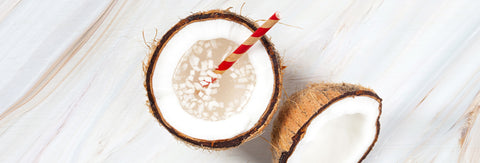Water. The source of life on earth, the most necessary element, and the simplest of health tenets – until today. Recent waves of alternative waters are filling store shelves with more options than we knew we needed. The challenge is discernment. Our natural instinct might tag these plant-based waters with their own sets of nutrient-laden health certifications, but how can we distinguish fad from folklore? To cut to the chase, we’ve tried 4 of some of the most talked-about waters right now to decide which is worth the hype, and which to let flow with the trendy tide.
Coconut Water
The top of the trendy heap, coconut water is one of the pioneers of alternative water sourcing. Loaded with many important nutrients like fibre, vitamin C and potassium, cocos nucifera contains 94% water and very little fat. The selling point? This water contains electrolytes and more potassium than a medium-sized banana, making it a super beneficial post-workout add- If you’re looking for the neutralizing effects, however, we’d stick to good old H20. This water, although refreshing and a great natural alternative to sugary sports drinks, should be consumed in moderation, as it not only contains natural sugars but too much potassium can have a negative effect on your kidneys and blood pressure.
Voted best used for: After an intense workout to replenish electrolyte stores and rehydrate
Maple Water
Similarly to syrup, farmers tap maple trees and collect sap as it starts to flow in the spring. While this is typically boiled down to create syrup, maple water goes straight from tree to bottle, ready for consumption from the moment it’s Lower in calories than coconut water (15 calories and 3gs of sugar per bottle), maple water is a good source of manganese, which helps regulate blood sugar, and aids in calcium absorption. Since this option is relatively high in sugar and doesn’t add much extra benefit, we say this isn’t a good swap for regular water
Voted best used for: When you’re feeling like your water could used a bit of added natural flavour
Aloe Vera Water
Great for digestion, aloe water has claimed the attention of wellness experts everywhere. An alkaline water, it naturally equalizes acidity levels, consequently steering illnesses away. Since aloe is a very water-dense plant, it is wonderful for hydration, helping increase the amounts of water in your intestine, stimulating peristalsis (which helps you poop). Aloe water is also great to help support good-bacteria regulation in the gut, which can restore intestinal flora. The bad news? To offset the plant’s super sour taste, many brands add a handsome helping of cane sugar. Often, this means a serving may have nearly half the sugar of a can of regular
Voted best used for: If you’re looking for a digestive boost
Birch Water
Sourced directly from the sap of the birch tree, birch water can be consumed fresh or fermented. High in nutritional value, it carries nutrients like vitamin C, calcium, potassium, phosphorus, manganese, magnesium, zinc and iron. Hailing from the Baltic countries, this water has been used as a remedy for years, credited for detoxifying, and cleansing. The science behind it, however, is still a little shaky. While many swear by this water source, research has yet to co-sign “cure-all” status.
Voted best used for: Hydrating while feeling in touch with nature
Our conclusion:
The waters we’ve described are among the most popular, but the gamut run the lot. From rose to watermelon, plant-based waters are on the rise, making the case for incorporating more nutrient-dense aqua to your regimen. And while alternative sources of water are great for experimenting and diversifying the ways we hydrate, there is simply no replacement for ever-faithful H20.
Feeling a little parched? Read more about staying hydrated here




